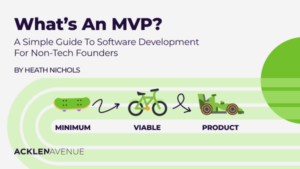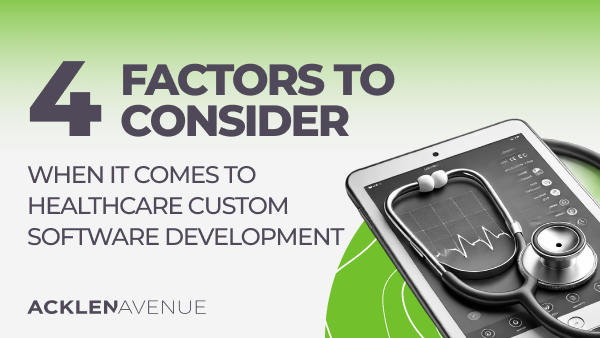
June 2, 2025
What’s an MVP? A simple guide to software development for non-tech founders.
July 9, 2024

Share:
Navigating the complexities of software development in healthcare requires that you approach every aspect of the continuum of care. From being able to complete tasks on-the-go to making sure regulations are met, these approaches have become essential in healthcare technology. Our extensive experience with healthcare clients has provided us with deep insights into custom software development. Whether the goal is to enhance patient experience or to boost operational efficiency, here are the key factors to consider when developing software in the healthcare sector.
In today’s fast-paced healthcare environment, the ability to edit or review information on the go has transitioned from a convenience to an essential requirement. Doctors and nurses must access and update patient information swiftly and efficiently, regardless of their location. Access to real-time data ensures that patient care remains uninterrupted and that critical decisions can be made promptly.
Equipped with mobile apps, practitioners are able to review patient histories, update treatment plans, and communicate with colleagues without being tethered to a desktop. This enhances the responsiveness of healthcare providers, enabling them to offer more personalized and immediate care to patients. Mobile access can lead to better patient outcomes by reducing delays and minimizing errors.
Mobile solutions can also improve workflow efficiency within healthcare facilities. By integrating mobile capabilities into healthcare software, tasks such as scheduling, billing, and inventory management can be streamlined. This integration saves time and reduces the administrative burden on healthcare professionals, allowing them to focus more on patient care. Enhancing mobility in healthcare software drives both operational efficiency and the quality of patient care. Which is also a great segway to our next key factor.
Seamless data integration across platforms offers a unified view that provides consistency and reliability throughout the organization. Seamless integrations transform fragmented data into actionable insights, empowering healthcare providers to deliver higher quality care and improving the overall healthcare experience.
A robust integration strategy ensures that all systems—whether electronic health records (EHR), laboratory information systems, or patient management applications—communicate effectively. This interoperability reduces data silos, allowing for real-time data exchange and minimizing the risk of errors caused by incomplete or outdated information. When platforms are integrated, healthcare professionals can access comprehensive patient histories, treatment plans, and diagnostic results from a single interface, streamlining workflows and reducing administrative burdens.
Integrated platforms also enhance patient engagement by providing a more cohesive experience. Patients benefit from streamlined communication channels, such as integrated appointment scheduling, prescription refills, and telehealth services. This unified approach improves patient satisfaction and fosters better compliance and outcomes.
Compliance is not just a box to check; it is an ongoing commitment to excellence and patient safety. Federal standards like HIPAA are mandatory to protect patient health information (PHI) and maintain trust. A development team with a deep understanding of PHI and HIPAA requirements is invaluable. Expertise in what can be shared, when, and how ensures that sensitive information is handled correctly, saving both time and money by avoiding costly breaches and fines.
Having a team that comprehends these regulatory nuances is essential to have a rigorous planning and design phase to create software that is both user-friendly and compliant. This phase should involve detailed risk assessments and security protocols to safeguard patient data. By integrating compliance into the development process from the outset, organizations can prevent future complications and ensure that their technology meets industry standards.
Continuous monitoring and updates are necessary to maintain compliance as regulations evolve. Regular audits, staff training, and system updates are crucial components of a robust compliance strategy. By staying proactive, healthcare providers can ensure their technology remains secure and effective, ultimately improving patient care and organizational efficiency.
We get it, you want to get a product out to the healthcare world as soon as possible. In the rush to deliver, coding and design shortcuts are sometimes taken to expedite development and provide a testable product. However, these shortcuts can lead to technical debt, which often remains unaddressed until it becomes a critical issue. This is why regular code and design reviews are essential to ensure long-term functionality and reliability.
Routine checks and audits are not just good practice; they are vital for maintaining the integrity of your healthcare software. Regularly revisiting and refining your codebase helps identify and fix potential issues before they escalate, ensuring that the system continues to operate smoothly. This proactive approach minimizes the risk of system failures, enhances performance, and maintains compliance with industry standards.
Consistent reviews foster a culture of continuous improvement within the development team. By prioritizing routine audits, you encourage best practices in coding and design, ultimately leading to a more robust and scalable product. This diligence not only improves the software’s quality but also builds trust with end-users, who rely on the technology for critical healthcare functions.
For XSolis, a healthcare technology company, Acklen Avenue provided a comprehensive development solution that spanned from initial concept to market-ready product. XSolis required a mobile application to complement their existing web-based offerings, enabling healthcare professionals to perform tasks on the go.
This required a team to build an app that had a deep level of integration and expertise in PHI and HIPPA regulations. After getting to prototype V1, we scaled back to the team so that they still had support and maintenance as needed. We brought knowledge in how to not only make a reliable application but we made the integration cohesive.
Healthcare Bluebook needed to develop a Minimum Viable Product (MVP) to leverage a partnership with IBM and meet federal regulatory requirements. The project demanded rapid development and deployment to capitalize on the partnership and regulatory timelines. Acklen Avenue assembled a team that worked closely with Healthcare Bluebook to break down ideas into user stories, implement an agile process, and deliver the product ahead of schedule.
Access to a broad ecosystem of technological support is essential for handling complex projects, particularly in the healthcare technology sector where innovations like AI, IoT, and secure cloud solutions are rapidly evolving. Experienced developers bring a wealth of knowledge to the table, enabling the use of the latest tools and technologies. This expertise helps in tackling challenges efficiently and delivering maintainable, high-quality code that stands the test of time.
Our technological expertise extends beyond mere implementation. We stay abreast of the latest trends and advancements in the field, continuously integrating new tools and practices into our development process. This proactive approach ensures that our clients benefit from the most efficient and effective solutions available.
A holistic approach to healthcare software development, characterized by comprehensive project management, flexibility, and technological expertise, is key to achieving successful outcomes. For healthcare technology companies, this strategy ensures that projects are handled with the utmost care and efficiency, leading to high-quality results that drive business growth.
At Acklen Avenue, we pride ourselves on being a trusted partner for healthcare technology companies, providing the expertise and flexibility needed to navigate the complexities of software development. Our dedicated teams are committed to delivering solutions that enhance patient care, improve operational efficiency, and ensure compliance with industry standards.
Let us help you bring your innovative healthcare solutions to life, ensuring that they are delivered on time, within budget, and to the highest standards of quality and compliance.